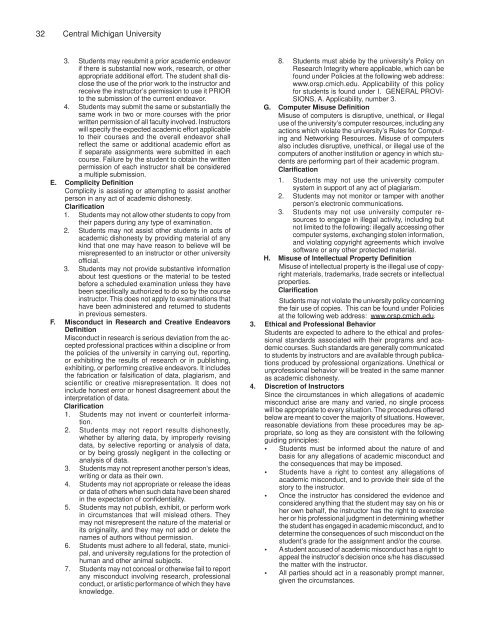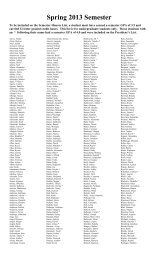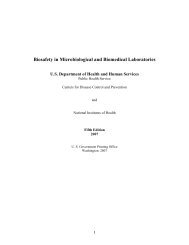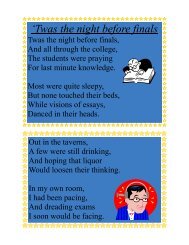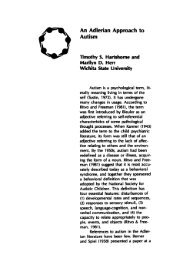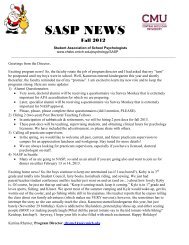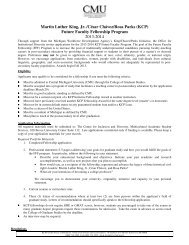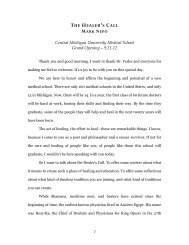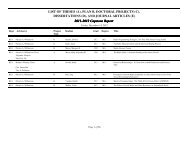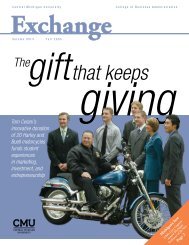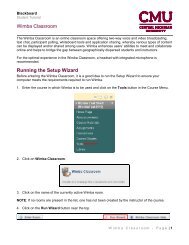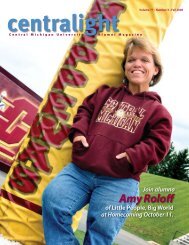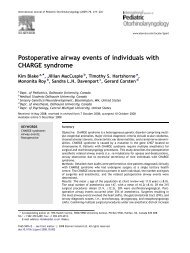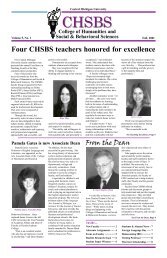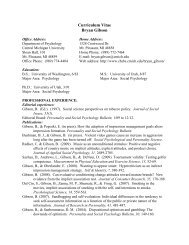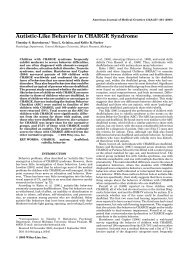Graduate Bulletin - Central Michigan University
Graduate Bulletin - Central Michigan University
Graduate Bulletin - Central Michigan University
Create successful ePaper yourself
Turn your PDF publications into a flip-book with our unique Google optimized e-Paper software.
32 <strong>Central</strong> <strong>Michigan</strong> <strong>University</strong><br />
E.<br />
F.<br />
3. Students may resubmit a prior academic endeavor<br />
if there is substantial new work, research, or other<br />
appropriate additional effort. The student shall disclose<br />
the use of the prior work to the instructor and<br />
receive the instructor’s permission to use it PRIOR<br />
to the submission of the current endeavor.<br />
4. Students may submit the same or substantially the<br />
same work in two or more courses with the prior<br />
written permission of all faculty involved. Instructors<br />
will specify the expected academic effort applicable<br />
to their courses and the overall endeavor shall<br />
reflect the same or additional academic effort as<br />
if separate assignments were submitted in each<br />
course. Failure by the student to obtain the written<br />
permission of each instructor shall be considered<br />
a multiple submission.<br />
Complicity Definition<br />
Complicity is assisting or attempting to assist another<br />
person in any act of academic dishonesty.<br />
Clarification<br />
1. Students may not allow other students to copy from<br />
their papers during any type of examination.<br />
2. Students may not assist other students in acts of<br />
academic dishonesty by providing material of any<br />
kind that one may have reason to believe will be<br />
misrepresented to an instructor or other university<br />
official.<br />
3. Students may not provide substantive information<br />
about test questions or the material to be tested<br />
before a scheduled examination unless they have<br />
been specifically authorized to do so by the course<br />
instructor. This does not apply to examinations that<br />
have been administered and returned to students<br />
in previous semesters.<br />
Misconduct in Research and Creative Endeavors<br />
Definition<br />
Misconduct in research is serious deviation from the accepted<br />
professional practices within a discipline or from<br />
the policies of the university in carrying out, reporting,<br />
or exhibiting the results of research or in publishing,<br />
exhibiting, or performing creative endeavors. It includes<br />
the fabrication or falsification of data, plagiarism, and<br />
scientific or creative misrepresentation. It does not<br />
include honest error or honest disagreement about the<br />
interpretation of data.<br />
Clarification<br />
1. Students may not invent or counterfeit information.<br />
2. Students may not report results dishonestly,<br />
whether by altering data, by improperly revising<br />
data, by selective reporting or analysis of data,<br />
or by being grossly negligent in the collecting or<br />
analysis of data.<br />
3. Students may not represent another person’s ideas,<br />
writing or data as their own.<br />
4. Students may not appropriate or release the ideas<br />
or data of others when such data have been shared<br />
in the expectation of confidentiality.<br />
5. Students may not publish, exhibit, or perform work<br />
in circumstances that will mislead others. They<br />
may not misrepresent the nature of the material or<br />
its originality, and they may not add or delete the<br />
names of authors without permission.<br />
6. Students must adhere to all federal, state, municipal,<br />
and university regulations for the protection of<br />
human and other animal subjects.<br />
7. Students may not conceal or otherwise fail to report<br />
any misconduct involving research, professional<br />
conduct, or artistic performance of which they have<br />
knowledge.<br />
3.<br />
4.<br />
G.<br />
H.<br />
8. Students must abide by the university’s Policy on<br />
Research Integrity where applicable, which can be<br />
found under Policies at the following web address:<br />
www.orsp.cmich.edu. Applicability of this policy<br />
for students is found under I. GENERAL PROVI-<br />
SIONS, A. Applicability, number 3.<br />
Computer Misuse Definition<br />
Misuse of computers is disruptive, unethical, or illegal<br />
use of the university’s computer resources, including any<br />
actions which violate the university’s Rules for Computing<br />
and Networking Resources. Misuse of computers<br />
also includes disruptive, unethical, or illegal use of the<br />
computers of another institution or agency in which students<br />
are performing part of their academic program.<br />
Clarification<br />
1. Students may not use the university computer<br />
system in support of any act of plagiarism.<br />
2. Students may not monitor or tamper with another<br />
person’s electronic communications.<br />
3. Students may not use university computer resources<br />
to engage in illegal activity, including but<br />
not limited to the following: illegally accessing other<br />
computer systems, exchanging stolen information,<br />
and violating copyright agreements which involve<br />
software or any other protected material.<br />
Misuse of Intellectual Property Definition<br />
Misuse of intellectual property is the illegal use of copyright<br />
materials, trademarks, trade secrets or intellectual<br />
properties.<br />
Clarification<br />
Students may not violate the university policy concerning<br />
the fair use of copies. This can be found under Policies<br />
at the following web address: www.orsp.cmich.edu.<br />
Ethical and Professional Behavior<br />
Students are expected to adhere to the ethical and professional<br />
standards associated with their programs and academic<br />
courses. Such standards are generally communicated<br />
to students by instructors and are available through publications<br />
produced by professional organizations. Unethical or<br />
unprofessional behavior will be treated in the same manner<br />
as academic dishonesty.<br />
Discretion of Instructors<br />
Since the circumstances in which allegations of academic<br />
misconduct arise are many and varied, no single process<br />
will be appropriate to every situation. The procedures offered<br />
below are meant to cover the majority of situations. However,<br />
reasonable deviations from these procedures may be appropriate,<br />
so long as they are consistent with the following<br />
guiding principles:<br />
•<br />
•<br />
•<br />
•<br />
•<br />
Students must be informed about the nature of and<br />
basis for any allegations of academic misconduct and<br />
the consequences that may be imposed.<br />
Students have a right to contest any allegations of<br />
academic misconduct, and to provide their side of the<br />
story to the instructor.<br />
Once the instructor has considered the evidence and<br />
considered anything that the student may say on his or<br />
her own behalf, the instructor has the right to exercise<br />
her or his professional judgment in determining whether<br />
the student has engaged in academic misconduct, and to<br />
determine the consequences of such misconduct on the<br />
student’s grade for the assignment and/or the course.<br />
A student accused of academic misconduct has a right to<br />
appeal the instructor’s decision once s/he has discussed<br />
the matter with the instructor.<br />
All parties should act in a reasonably prompt manner,<br />
given the circumstances.


